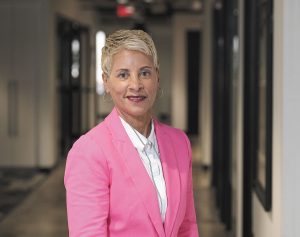Subscriber Benefit
As a subscriber you can listen to articles at work, in the car, or while you work out. Subscribe Now (IL photo/Eric Learned)
(IL photo/Eric Learned)
Ice Miller LLP
University of Michigan Law School, 1980
Why did you decide to enter the legal profession?
I was propelled by something inside me that was a deep sense of fairness. I was drawn to the law as a system of rights and the possibility of ordering and improving society using law.
What does “diversity, equity and inclusion” mean to you?
Although we often see and hear these words together or as one, they each represent three very distinct and complementary notions:
Diversity: Simply respecting the differences among us — as people we all want to be valued and seek to have the full opportunity for success. Diversity exists among us without doing anything.
Equity: This is about leveling the playing field and opportunities for all.
Inclusion: This is the intentional action involved in everyone doing their part to create belonging through:
1. Sphere of influence
2. Inviting others in
3. Storytelling
4. Every voice matters
How did you get involved in DEI work, and why have you stuck with it?
My DEI journey began when the Indiana Supreme Court established the Commission on Race and Gender Fairness in 1999. When I returned to law firm work at Ice Miller, I worked as a member of the firm’s Diversity Committee, and that evolved with my current role as partner in charge of DEI. I stay with the work because I am deeply committed to creating and maintaining equal opportunity, fairness and inclusivity across the legal profession and at my law firm. I do as the late and great Justice Ruth Bader Ginsburg said: “Fight for the things you care about. But do it in a way that will lead others to join you.”
What would you say to someone who perceives “DEI” as a business “buzzword”?
I would say that the buzzword may be what that person hears in their business or work environment. I would then invite the person to think about it differently (without the “buzz”):
• Organizations with ethnic and cultural diversity are 36% more likely to be profitable than peers.
• Gender diversity brings 25% more likely profitability.
• Companies with diverse employees have a 20% higher rate of innovation.
As law firms and other legal employers know, law school grads seek out and expect to work in places that value diversity.
What is the most significant change you’ve seen in the legal profession since you began your career?
The most significant change in the legal profession since I began my career is the growth in the number of diverse persons in all aspects of the program, from legal assistants to lawyer to judge. So much of this change is due to the efforts of many who came before me, and so I am especially mindful and grateful to those predecessors.
How do you spend your free time?
If I told you, it wouldn’t be “free” anymore.
What was your favorite — and least favorite — class in law school?
Favorite: Labor Law. Least favorite: Property Law.
What’s the best advice you’ve ever received?
Be a good listener — listen attentively, actively and with patience.
You have three major “firsts” attached to your name: the first woman, first person of color and first (and only) woman of color on the Indiana Supreme Court bench. How has being the “first” in so many respects shaped your approach to DEI work?
Going forward, the experience has given me the energy and dedication to be of real support to other “firsts” and “onlys” on one hand and the commitment to the work of creating a world where the first and only is not necessary any longer.
You have experience both on and off the bench. Have your efforts to promote diversity in the legal profession differed based on which position you’ve been in?
Fundamentally, no — the concepts of diversity, equity and inclusion are the same. The environments involved are very different, but the underlying concepts are not different.
Looking specifically at the issue of women in the law: You were the only woman on the Supreme Court during your time on the bench, and now there is still only one woman there. What work needs to be done to put more women in the highest levels of the judiciary?
Expanding the number of women in the judiciary is extremely important. I embrace my role as a change agent in this regard and I do whatever I can to support women who seek to become a member of the judiciary. We know that having a judiciary, at all levels, that is representative of society is essential for people to have confidence and trust in the courts.
Please enable JavaScript to view this content.
